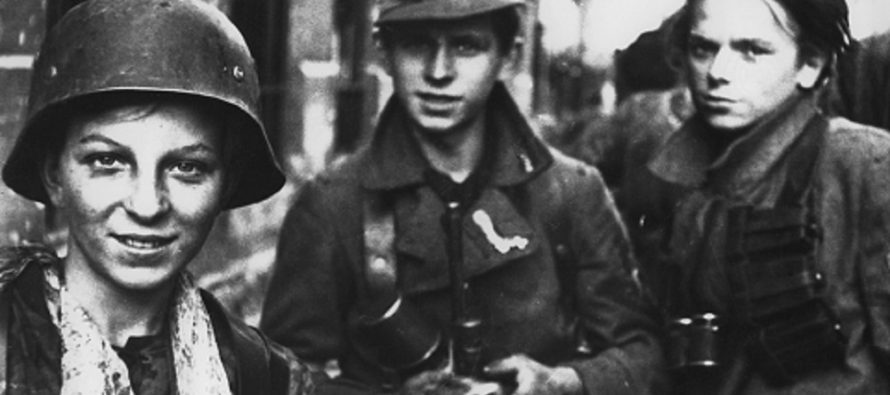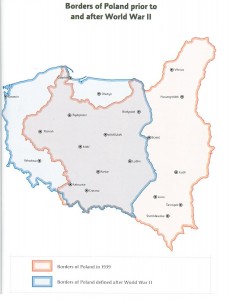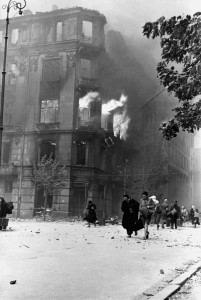“September 1939 – Poland caught in War with the svastika and the hammer and sickle”

Story Highlights
- According to the Christian spirit one should forgive. In 1965, twenty years after the end of WW II, the Polish Catholic bishops wrote a pastoral letter of reconcilliation to their German brothers, in which they declared: "We forgive and ask for forgiveness". Forgiveness does not mean forgetting, but without pardoning it is difficult to build a common future.
Related Articles
By Karol Bachura*
World War II, the bloodiest world war, which the humanity has ever known, started in September 1939 with the German (Sept. 1) and Soviet (Sept. 17) invasion of Poland. The Poles were not assisted and were therefore defetated but not conquered. The countrie’s authorities and the army were re-constructed in exile. On the Polish territories the underground state and the Home Army operated throughout the war. In the final years of the war Poland fell victim of yet more aggression depicted in the Wasaw Uprising of 1944. Despite enormous war-time efforts and massive material and human losses (over 6 million Poles dead), Poland could not fully enjoy victory although it suffered the greatest human and material losses. Half of the pre-war territories were annexed to the USSR, while after the war the rest was totally controlled by the Soviet communist divctatorship for the next 45 years.
Roots/allied enemies/consequences
It is said that history is yesterday's politics while politics is today's history. To be able to understand the pre-war surrounding more clearly one should dig deeper into historical facts. After World War I, Poland took its legal place on the map of Europe following 123 years of political absence. The country was rewon after more than 100 years of war, not only in two national uprisings, but also with the participation of the Poles in other peoples' struggle for self-determination in line with the slogan: "Your freedom is also our freedom", helped also by the weakening of the power of the then conquerors – the empires of Prussia, Russia and Austro-Hungary. The fight for freedom constitues one of Polish national prides whether we talk about 1919-1920, 1939-1945 or 1989. After World War I, in 1918, Poland regained independence, and in the following year, 1919, the Polish-Bolshevik war began.
On August 15, we commemorated the anniversary of the so-called "Miracle of the Vistula", a battle that stopped the Bolshevik army from marching westward and is considered by some as one of the most important battles in the world history. If in 1920 the Bolshevik soldats, "through the corpse of Poland” (as stated by Soviet army commander, Tukhachevsky), would lead to global revolution in Western Europe, the history of the continent and the world would have been much different.
After the Treaty of Versailles (1919) due to its western territorial benefits Poland was considered by Germany as a "parasite state", and with the passing of time Third Reich saw it as a space for "planned occupation". After the defeat of the Bolshevik army in 1920 for Soviet Russia Poland had been a first-rate enemy, a barrier to exporting Boshevik revolution to the West. Until 1939, both of the aggressive totalitarian states surrounded Poland with an almost closed cordon, but yet Poland did not give in. In summer 1939, Hitler and Stalin decided on a military alliance whose main target would be Poland. The Ribbentrop-Molotov Pact, signed on August 23, 1939, in its secret annex decided on the full partition of the Polish territory between the two totalitarian allies. The united forces of those totalitarian powers were to make Poland powerless. Although preparations for war had been underway, Poland's potential in face of its ideologically and militarily strong neighbors could give it no chance in direct confrontation. On September 1, the Nazi Germany army attacked Poland, and on September 17, the Polish Eastern border was invaded by the Soviet army.
Poland fought alone against the two totalitarian powers and was the first country to openly resist Hitler's destructive intentions. Great Britain and France, led by obligations towards Poland, declared war on the Third Reich already on September 3, but in the early weeks there were just empty statements. Having no military support, the Polish units could not stop the invaders' attacks though they showed unprecedented bravery. For 35 days Poland was fighting on its own and with sheer determination facing simultaneously two totalitarian neighbors – the Third Reich and the Soviet Union. It was defeated and occupied, but never capitulated. The Poles have never agreed to the occupation. They created a unique “Underground State”, which operated secretly against the Geman Nazis. For the Poles the fight for freedom has always been above personal life and material goods. Two and a half weeks after Hitler’s aggression, on September 17, contrary to the agreements signed, Poland was attacked by the Soviet army. Despite the supremacy of Nazi and Soviet forces combined, the resistance of the Poles lasted until October 6, while the general resistance to the enemies continued until the end of the war.
Bringing back to mind the time of 80 years ago, we are all fully aware that World War II has brought countless victims and suffering to the peoples of Europe and the world. By various accounts, around 6 million Poles died during the war and in percentage this has been the largest loss among the war participating states. Of those 6 million Poles, 3 million were Polish Jewish. Given the highest number of citizens of Jewish descent living in pre-war Poland since many centuries, Hitler decided to build camps and ghettos in the occupied territory of Poland, such as the infamous Auschwitz-Birkenau camp.
Therefore it is shocking for Poles to listen to claims that Poland is the one who started World War II, as well as it outrageous to hear about Holocaust denial. Mistakenly some circles try to put an equation mark between the executioner and the victim. Facts speak on their own - the number of Polish victims was 6 million. It might be interesting to known the fact that there were 35 million inhabitants in Poland before the outbreak of the Second World War, while after its end only 23 million people were living in the country boundries (6 million perished and the other 6 million Poles were dispersed around the globe).
Uncompensated losses
The World War II, which raged through Poland from September 1939 to 1945, constitutes catastrophy in every aspect because it destroyed the country, its people and elites, shifted borders, partly into a new region which was also a dilapidated area, brought death and pain to almost every Polish family and brought about the extermination of Polish Jews. It destroyed relationship between the Poles and neighboring peoples, turned coexistence into hostility, and then imposed communism for 45 years. In the aftermath of war Poland suffered inappropriate loss: over 30% of population - only by 1978 the Poles managed to reach the level of pre-war 35 million inhabitants, furthermore over 60 % of lawyers, 40 % of doctors, 30 % of scientists and 30% of priests lost ther lives during the war. More than 40 % of the countries national property was destroyed, cities demolished – some like Warsaw alost in full, 20 % of pre-war territory lost.
As the consequences of the Potsdam Conference today's territory of Poland has shrunk by about 80 thousand km2 in comparison with the pre-war area (that is almost 3 times the territory of todays Albania). It is hard to say exactly how many Polish citizens remained in the East. It is known, however, that a massacre of Polish intelligentsia and officers took place in the Katyn forest in 1940. Over 20 thousand officers and Prisoners of War were annihilated by Soviet NKVD on direct order of Stalin. Tens of thousands of the Poles were shifted by the Soviet regime from pre-war Polish territories to Kazakhstan, Siberia and other parts of USSR. Some became part of the first Polish armed forces in the territory of the Soviet Union created in 1941 (the year the German-Soviet war began), which left USSR via Middle East to fight in the Western front. The number of Poles in the USSR was so massive that it allowed the formation of a second Polish Army – this time communist based, which accompanied the Soviets on their road to Berlin in 1944 and served as the base for formation of the Polish Peoples Army after Poland was placed in the Soviet sphere of influence.
One cannot forget to mention the Warsaw Uprising - the biggest armed resistance in German occupied Europe and the last struggle for Poland’s full independence. Under the command of the underground Home Army the uprising began on August 1, 1944 and lasted 63 days. The insurgents testified during those days that their freedom was priceless. Third Reich's interior minister, Heinrich Himmler, reported on September 21 that "this was the fiercest battle we have waged since the beginning of the war. It was comparable only to the house-to-house fighting in Stalingrad”. The Warsaw Uprising was militarily against the Germans who held the city under occupation, while politically it was against the USSR and Polish Communist puppets. The aim of the uprising was to liberate the capital before the Red Army entered, show nationalist empowerment of the Government of the Republic of Poland in exile (based in London), and the restraint of the vassalization and sovietization project of Poland. The plan and goals did not succeed. The uprising units, which were left at the mercy of fate, waged a lonely and unequal war for more than two months.
Losses among insurgents - often juveniles and young - accounted for more than 16,000 killed. Human casualties in geeneral of the uprising along with the majority of civilian population of Warsaw are estimated at nearly 200,000. After the fall of the uprising some 550,000 people were expelled from the capital, of whom about 150,000 were sent to forced labor or concentration camps. Due to war and insurgent fighting as well as the systematic destruction of the city by the German army more than 85 % of Warsaw was left in ruins. Poland irreversibly lost a great part of its national heritage. The Warsaw Uprising was an echo of a fight for human dignity, the symbol of revolt against humiliation and abasement. Warsaw became the city that actually saw war and managed to survive its own death.
Poles started the process of caluculating the material damage caused by the war and the agression and occupation. The damage was huge and it will be difficult to put in numbers. Hoiwever one must focus only on material damage, as one cannot put a price tag on human life, be it one life or six million lives.
“Your freedom is also our freedom”
During the war years, Poles scattered throughout Europe constituted the fifth largest army in World War II. The Polish Army played an essential role in the liberation of Italy, France, Belgium and the Netherlands in 1944-1945 period. Among the famous battles that were won is that of Monte Cassino, which paved the way for the Allies to Rome. The Polish Army had taken part in the liberation of a dozens of Italian cities, including Ancona and Bologna. In the North of France it contributed significantly to the battle of Falaise Gap opening the way to Paris. It later liberated Ypres and Ghent in Belgium as well as Breda in the Netherlands. The Polish air fleet had extraordinary merits in the Battle of London. The Polish navy, on the other hand, fought at Narvik, on the Atlantic, in the Mediterranean and the Aegean seas. The soldiers who fought on the western fronts remained there, as did the government in exile in London up until 1990 when Lech Walesa – the former “Soldarity” trade unions and communist opposition leader was voted president following free presidential elections. Official state insignia were then handed over to him by the last president of Poland in exile thus ending the history of the Polish Government in Exile which started in 1939.
Reconcilliation – forgive but not forget
According to the Christian spirit one should forgive. In 1965, twenty years after the end of WW II, the Polish Catholic bishops wrote a pastoral letter of reconcilliation to their German brothers, in which they declared: "We forgive and ask for forgiveness". Forgiveness does not mean forgetting, but without pardoning it is difficult to build a common future.
When it comes to our Eastern partner, the situation is more complicated and sensitive. The Russian side's views on the common historical issues do not coincide with those of the Polish side as for example, among other things, the case of admitting that the Katyn massacre was genocide or the Soviet aggression against Poland on September 17, 1939 plus many more open issues. We hope that the Russian side will eventually choose the path of merit based discussions on historical issues for the benefit of good bilateral relations. From our side, we adhere firmly to the attitude of building good relationship based on truth and facts.
Today’s Poland – a strong NATO ally
When we speak about 80 years since World War II, we are actually talking about some dates and anniversaries that are inseparably linked to the history of Poland in the last centennial. This year, Poland commemorated the 75th anniversary of the Warsaw Uprising, the 30th anniversary of the first free elections, the 20th anniversary in NATO membership and the 15th anniversary of joining the EU. The Euro-Atlantic anchors make Poland a strong nad realiable ally in Europe and globally.
Albanian accents to commemoration
Just recently published book in Albanian language - “Poland-Victim of World War II”, written by prof. S.V. Mehilli gives a lot more insight on the above subject. On 17 September the National Museum in Tirana, in collaboration with the Embassy of the Republic of Poland will open an exhibition devoted to the 80 Anniversary of the outbreak of WWII as well as the Warsaw Uprising of 1944.
*Karol Bachura is the Ambassador of Poland to Albania







